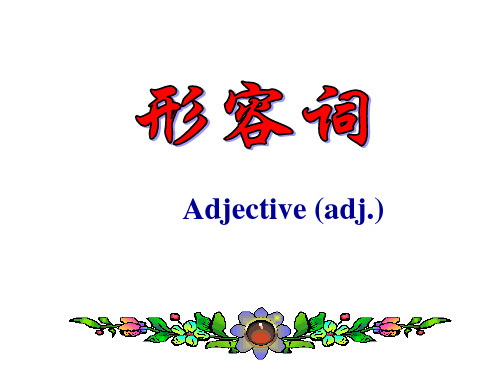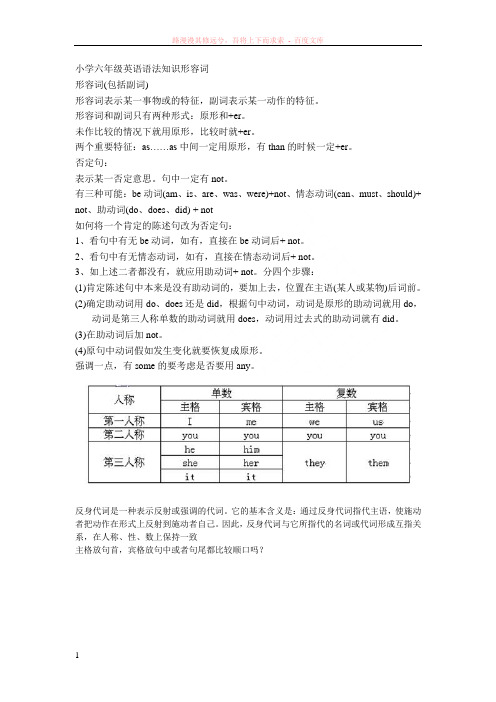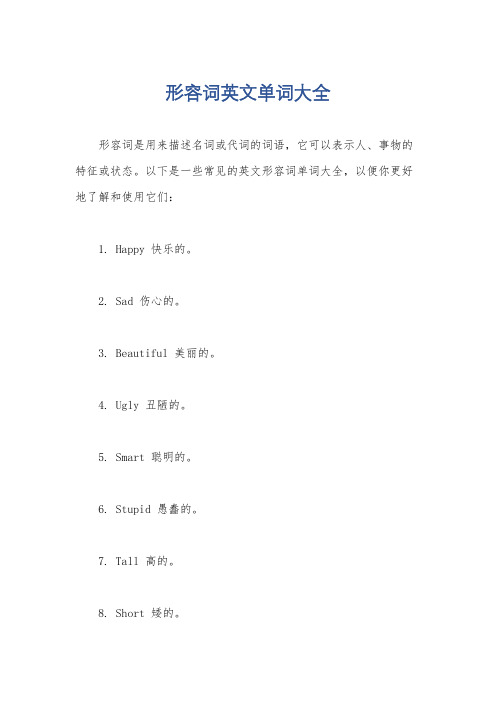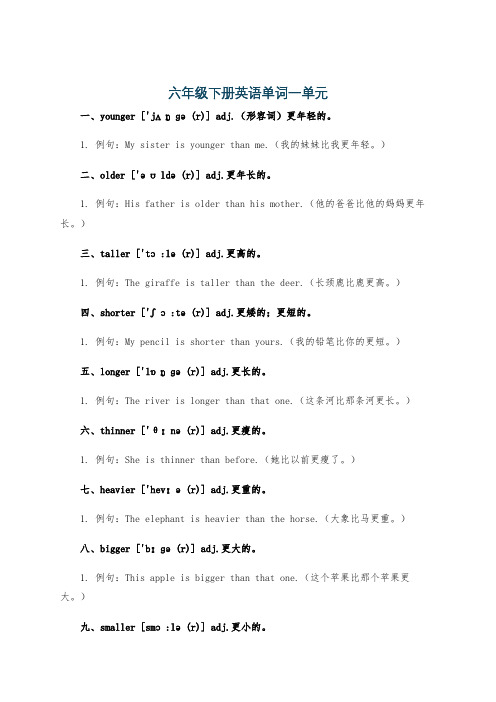【免费下载】小学六年级英语形容词大全
英语形容词

2.形容词可以放在____be__动__词_、__系_动__词__之后, 用来叙述和说明主语的特征或状态。
It feels happy.
She looks beautiful. The apples are red.
2.形容词可以放在__系__动_词______之后,用来 叙述和说明主语的特征或状态。
2.我喝的茶比他多. I drink more tea than he (does).
3.他吃的饭比我少. He has less rice than I (do).
4.一班的学生比二班多. There are more students in Class 1 than in Class 2.
the + 最高级 +(名词)+in/of/among …
3.Kate is more beautiful than Lily is. She is five years older than I am. I drink more tea than he (does).
than前后句子的时态相同。通常用be动词 和助动词do, does 等来简答。
4.I have more pens than you (do). many,much,little,few等词必须带名词。
Li Yong is funny.
Pan Changjiang is funnier than Li Yong.
Ted is the funniest.
Vince is heavy . David is heavier than Vince. Mr Lin is the heaviest of them.
(word完整版)小学英语常见形容词及

小学英语常有形容词及比较级、最高等变化一览表1.在形容词词尾加上“ er、〞“ est构〞成比较级、最高等:bright 〔光明的〕—brighter —brightestbroad〔广阔的〕—broader—broadestcheap〔廉价的〕—cheaper—cheapestclean〔干净的〕—cleaner—cleanestclever〔聪颖的〕—cleverer—cleverestcold〔寒冷的〕—colder—coldestcool〔凉的〕—cooler—coolestdark〔黑暗的〕—darker—darkestdear〔贵的〕—dearer—dearestdeep〔深的〕—deeper—deepestfast〔迅速的〕—faster—fastestfew 〔少的〕—fewer —fewestgreat〔伟大的〕—greater—greatesthard〔困难的,硬的〕—harder—hardesthigh〔高的〕—higher—highestkind〔和蔼的〕—kinder—kindestlight 〔轻的〕—lighter —lightestlong〔长的〕—longer—longestloud〔响亮的〕—louder—loudestnear〔近的〕—nearer—nearestnew〔新的〕—newer—newestpoor〔穷的〕—poorer—poorestquick〔快的〕—quicker—quickestquiet 〔沉寂的〕—quieter—quietestrich 〔丰饶的〕—richer—richestshort 〔短的〕—shorter —shortestslow〔慢的〕—slower—slowestsmall〔小的〕—smaller—smallestsmart〔聪颖的〕—smarter—smartestsoft 〔娇嫩的〕—softer —softeststrong〔强壮的〕—stronger—strongestsweet〔甜的〕—sweeter—sweetesttall 〔高的〕 -taller-tallestthick〔厚的〕—thicker—thickestwarm 〔温暖的〕—warmer—warmestweak〔弱的〕—weaker—weakestyoung〔年轻的〕—younger—youngest2.双写最后一个字母,再加上“ er、〞“ est构〞成比较级、最高等: big〔大的〕—bigger—biggesthot 〔热的〕—hotter —hottestred〔红的〕—redder—reddestsad〔伤心的〕—sadder—saddestthin 〔瘦的〕—thinner —thinnestwet 〔湿的〕—wetter —wettestmad〔疯的〕—madder—maddest3.以不发音的字母 e 结尾的形容词,加上“ r、〞“ st构〞成比较级、最高等:able〔能干的〕—abler—ablestbrave〔勇敢的〕—braver—bravestclose〔凑近的〕—closer—closestfine 〔好的,圆满的〕—finer —finestlarge〔巨大的〕—larger—largestlate 〔迟的〕—later —latestnice〔好的〕—nicer—nicestripe〔成熟的〕—riper—ripestrude〔莽撞的〕—ruder—rudestsafe〔安全的〕—safer—safeststrange〔奇怪的〕—stranger—strangestwide〔宽广的〕—wider —widestwise〔睿智的,聪颖的〕—wiser—wisestwhite 〔白的〕—whiter —whitest4.以字母 y 结尾的形容词,把 y 改为 i,再加上“ er、〞“ est构〞成比较级、最高等:busy〔忙碌的〕—busier—busiestdirty 〔脏的〕—dirtier —dirtiestdry〔无聊的〕—drier—driestearly〔早的〕—earlier—earliesteasy〔简单的〕—easier—easiestfriendly 〔友好的〕—friendlier —friendliestfunny〔好玩的〕—funnier —funniesthappy〔快乐的〕—happier—happiesthealthy〔健康的〕—healthier —healthiestheavy〔重的〕—heavier—heaviesthungry〔饿的〕—hungrier—hungriestlazy〔懒散的〕—lazier—laziestlucky〔好运的〕—luckier—luckiestnaughty〔俏皮的〕—naughtier—naughtiestnoisy〔喧杂的〕—noisier—noisiestpretty 〔美丽的〕—prettier —prettiestsilly〔傻的〕—sillier—silliestspicy〔辣的〕—spicier—spiciestthirsty 〔渴的〕—thirstier —thirstiestugly〔丑的〕—uglier—ugliest5.双音节、多音节形容词,在单词前面加上“ more、〞“ most构〞成比较级、最高等:afraid〔害怕的〕—more afraid—most afraidbeautiful 〔美丽的〕—more beautiful —most beautifulcareful〔仔细的〕—more careful—most carefulcheerful 〔快乐的〕—more cheerful—most cheerfulcrowded〔拥挤的〕—more crowded—most crowdeddangerous〔危险的〕—more dangerous—most dangerousdelicious〔美味的〕—more delicious—most deliciousdifficult 〔困难的〕—more difficult —most difficultexciting〔令人愉悦的〕—more exciting—most excitingexpensive〔昂贵的〕—more expensive—most expensivefamous〔出名的〕—more famous—most famousfrightened 〔惊讶的〕—more frightened —most frightenedfrightening 〔令人害怕的〕—more frightening —most frighteninghard-working 〔勤奋的〕—more hard-working—most hard-workinghelpful 〔有帮助的〕—more helpful —most helpfulhonest〔老实的〕—more honest—most honestimportant 〔重要的〕—more important —most importantinteresting 〔幽默的〕—more interesting —most interestingpolite 〔有礼貌的〕—more polite —most politeterrible 〔可怕的〕—more terrible —most terrible tired 〔累的〕—more tired —most tired6.不规那么变化的形容词:bad〔坏的〕—worse—worstfar〔远的〕—farther —farthest (far —further —furthest) good〔好的〕—better —bestill〔病的〕—worse—worstlittle 〔少的〕—less—leastmany〔多的〕—more —mostmuch〔多的〕—more —mostold〔年老的〕—older —oldest ( old—elder—eldest) well 〔好的,身体好的〕—better —best。
小学六年级英语语法知识形容词

小学六年级英语语法知识形容词形容词(包括副词)形容词表示某一事物或的特征,副词表示某一动作的特征。
形容词和副词只有两种形式:原形和+er。
未作比较的情况下就用原形,比较时就+er。
两个重要特征:as……as中间一定用原形,有than的时候一定+er。
否定句:表示某一否定意思。
句中一定有not。
有三种可能:be动词(am、is、are、was、were)+not、情态动词(can、must、should)+ not、助动词(do、does、did) + not如何将一个肯定的陈述句改为否定句:1、看句中有无be动词,如有,直接在be动词后+ not。
2、看句中有无情态动词,如有,直接在情态动词后+ not。
3、如上述二者都没有,就应用助动词+ not。
分四个步骤:(1)肯定陈述句中本来是没有助动词的,要加上去,位置在主语(某人或某物)后词前。
(2)确定助动词用do、does还是did,根据句中动词,动词是原形的助动词就用do,动词是第三人称单数的助动词就用does,动词用过去式的助动词就有did。
(3)在助动词后加not。
(4)原句中动词假如发生变化就要恢复成原形。
强调一点,有some的要考虑是否要用any。
反身代词是一种表示反射或强调的代词。
它的基本含义是:通过反身代词指代主语,使施动者把动作在形式上反射到施动者自己。
因此,反身代词与它所指代的名词或代词形成互指关系,在人称、性、数上保持一致主格放句首,宾格放句中或者句尾都比较顺口吗?时态是谓语动词所表示的动作或情况发生时间的各种形式.英语动词有16种时态,但是常见的只有九种:一般现在时、一般过去时、一般将来时、现在进行时、过去进行时、现在完成时、过去完成时,过去将来时,现在完成进行时。
常用的时态只有八种。
1.一般现在时的用法1)表示经常性、习惯性的动作;表示现在的状态、特征和真理.句中常用often,usually,every day等时间状语。
形容词英文单词大全

形容词英文单词大全形容词是用来描述名词或代词的词语,它可以表示人、事物的特征或状态。
以下是一些常见的英文形容词单词大全,以便你更好地了解和使用它们:1. Happy 快乐的。
2. Sad 伤心的。
3. Beautiful 美丽的。
4. Ugly 丑陋的。
5. Smart 聪明的。
6. Stupid 愚蠢的。
7. Tall 高的。
8. Short 矮的。
9. Fast 快速的。
10. Slow 缓慢的。
11. Big 大的。
12. Small 小的。
13. Strong 强壮的。
14. Weak 虚弱的。
15. Brave 勇敢的。
16. Cowardly 胆小的。
17. Kind 友善的。
18. Mean 刻薄的。
19. Funny 有趣的。
20. Boring 无聊的。
21. Clever 聪明的。
22. Clumsy 笨拙的。
23. Generous 慷慨的。
24. Stingy 小气的。
25. Honest 诚实的。
26. Dishonest 不诚实的。
27. Polite 有礼貌的。
28. Rude 粗鲁的。
29. Tired 疲倦的。
30. Energetic 精力充沛的。
以上列举了一些常见的英文形容词单词,希望对你有所帮助。
如果你需要更多的形容词单词,可以参考英语词典或在线资源。
形容词在英语中非常重要,它们可以帮助我们更准确地描述事物,丰富语言表达。
希望你能够灵活运用这些形容词,丰富你的词汇量,提高你的英语表达能力。
六年级下册英语单词一单元

六年级下册英语单词一单元一、younger ['jʌŋɡə(r)] adj.(形容词)更年轻的。
1. 例句:My sister is younger than me.(我的妹妹比我更年轻。
)二、older ['əʊldə(r)] adj.更年长的。
1. 例句:His father is older than his mother.(他的爸爸比他的妈妈更年长。
)三、taller ['tɔ:lə(r)] adj.更高的。
1. 例句:The giraffe is taller than the deer.(长颈鹿比鹿更高。
)四、shorter ['ʃɔ:tə(r)] adj.更矮的;更短的。
1. 例句:My pencil is shorter than yours.(我的铅笔比你的更短。
)五、longer ['lɒŋɡə(r)] adj.更长的。
1. 例句:The river is longer than that one.(这条河比那条河更长。
)六、thinner ['θɪnə(r)] adj.更瘦的。
1. 例句:She is thinner than before.(她比以前更瘦了。
)七、heavier ['hevɪə(r)] adj.更重的。
1. 例句:The elephant is heavier than the horse.(大象比马更重。
)八、bigger ['bɪɡə(r)] adj.更大的。
1. 例句:This apple is bigger than that one.(这个苹果比那个苹果更大。
)九、smaller [smɔ:lə(r)] adj.更小的。
1. 例句:The cat is smaller than the dog.(猫比狗更小。
)十、stronger [strɒŋɡə(r)] adj.更强壮的。
1. 例句:The athlete is stronger than ordinary people.(这个运动员比普通人更强壮。
六年级下册英语重点单词句子

六年级下册英语重点单词句子一、重点单词。
1. younger [ˈjʌŋɡə(r)] 形容词(adj.),比较级形式,意为“更年轻的;更幼小的”。
2. older [ˈəʊldə(r)] 形容词(adj.),比较级形式,意为“更年长的;更旧的”。
3. taller [ˈtɔːlə(r)] 形容词(adj.),比较级形式,意为“更高的”。
4. shorter [ˈʃɔːtə(r)] 形容词(adj.),比较级形式,意为“更短的;更矮的”。
5. longer [ˈlɒŋɡə(r)] 形容词(adj.),比较级形式,意为“更长的”。
6. thinner [ˈθɪnə(r)] 形容词(adj.),比较级形式,意为“更瘦的”。
7. heavier [ˈheviə(r)] 形容词(adj.),比较级形式,意为“更重的”。
8. bigger [ˈbɪɡə(r)] 形容词(adj.),比较级形式,意为“更大的”。
9. smaller [ˈsmɔːlə(r)] 形容词(adj.),比较级形式,意为“更小的”。
10. stronger [ˈstrɒŋɡə(r)] 形容词(adj.),比较级形式,意为“更强壮的”。
11. yesterday [ˈjestədeɪ] 名词(n.),意为“昨天”。
12. last [lɑːst] 形容词(adj.),意为“上一个的;刚过去的”;也可作动词(v.),意为“持续”。
13. before [bɪˈfɔː(r)] 介词(prep.)/副词(adv.),意为“在……之前”。
14. hotel [həʊˈtel] 名词(n.),意为“旅馆”。
15. fixed [fɪkst] 动词(v.),fix的过去式,意为“修理;固定”。
16. broken [ˈbrəʊkən] 形容词(adj.),意为“破损的;弄坏了的”。
17. lamp [læmp] 名词(n.),意为“台灯”。
三到六年级上册形容词
三到六年级上册形容词funny滑稽的;好笑的comic滑稽的interesting有趣的beautiful美丽的cute可爱的friendly友好的quiet安静的new新的strong健壮的thin瘦的fat胖的tall高的high高的short短的;矮的long长的small小的big大的little小的cold寒冷的cool凉爽的warm暖和的hot 热的sunny晴朗的windy多风的cloudy阴天的;多云的snow下雪的rainy多雨的pretty美观的expensive昂贵的cheap便宜的more更多的old年老的young年轻的funny滑稽可笑的kind和蔼的strict严格的clever聪明的polite有礼貌的;客气的shy羞怯的angry生气的afraid害怕的sad难过的worried担心的happy高兴的tired疲倦的fresh新鲜的healthy健康的hard-working工作努力的helpful有用的delicious美味的hot辣的sweet甜的thirsty口渴的favorite特别喜爱的any任何的dirty肮脏的national国家的American美国的Canadian加拿大的Spanish西班牙的Italian意大利的first(1st)第一的second(2nd)第二的third(3rd)第三的fourth(4th)第四的fifth(5th)第五的twelfth(12th)第十二的twentieth(20th)第二十的twenty-first(21st)第二十一的twenty-third(23rd)第二十三的thirtieth(30th)第三十的open开着的lovely可爱的far较远的bad坏的nice好的fast快的more更多的deep深的early早到的slow慢的excited兴奋的special 特殊的last上一个的love爱你的clean干净的right正确的next下一个的wonderful极好的busy忙的amazing令人惊奇的三到六年级上册动词buy买help 帮助lost丢失find找到ready准备pass传递try 尝试fly放pack收拾(行李)wait等待sale特价出售shop购物know知道wash洗do做read看;读play玩;参加cook烹饪cooking烹饪drink喝eat吃sing唱draw画live居住boating划船take上(课)dancing跳舞;舞蹈need需要win获胜pick 摘fall落下;秋天roll滚动meet开会swim游泳learn学习want想要send邮寄move搬家plant种植walk 行走climb往上爬jump跳keep保持某种状态show展现;指引look看一看teach教turn转弯ask问gave提供follow跟着tell告诉get到达by乘down减少stop停下wear戴attention注意visit拜访hiking远足goal射门join加入share分享stay保持use使用type打字wear穿breath呼吸count数数chase追赶hurt受伤sit坐hear听见worry担忧stuck陷住pull拉拽over结束paint 用颜料画finish完成speak会说say说dance跳舞start开始studies(study的第三人称单数形式)学习三到六年级上册副词really真地so much 非常地straight成直线地quickly迅速地well健康;身体好sometimes有时often时常usually经常always总是三到六年级上册词组help yourself随便吃next to 紧邻,在....近旁get up起床go to school去上学go home回家go to bed上床睡觉come on快;加油of course当然just a minute稍等一会be careful小心wash my clothes洗我的衣服read books读书do homework做作业play football 踢足球play sports做体育运动sing English songs唱英文歌曲play the pipa弹琵琶do kung fu练武术draw cartoon画漫画play basketball打篮球play ping-pong打乒乓球speak English说英语we’ll=we will no problem没问题in front of 在.....前面go boating去划船aren’t=are not rabbit不是兔子eat breakfast吃早饭have ... class上...课play sports进行体育运动do morning exercises做早操eat dinner吃晚饭clean my room打扫我的房间go for a walk去散步go shopping去购物take a dancing class上舞蹈课go swimming去游泳go on a picnic去野餐pick apples摘苹果make a snowman 堆雪人go swimming去游泳good job做得好 a few 一些look for寻找drink water喝水doing morning exercises(正在)做早操eating lunch(正在)吃午饭having....class(正在)上....课reading a book(正在)看书listening to music(正在)听音乐keep to the right 靠右keep your desk clean 保持你的课桌干净talk quietly 小声讲话take turns按顺序来on foot步行slow down慢下来pay attention to注意see a film看电影take a trip去旅行get together聚会see a doctor看病lots of大量take a deep breath深深吸一口气count to ten数到十try on试穿each other相互其它(所有格)your 你(们)的his他的her她的yours你的;你们的whose谁的mine我的our我们的yours你(们)的his他的hers她的theirs他(她、它)们的ours我们的their他们的(人称)I我me我she她he 他him他us我们they他们them他、她、它们this这个that那个these这些those那些(方位)on在.....上in在......里under在....下面near在……的旁边front正面between在....中间above在...上面beside在旁边behind在...后面left左边right右边(疑问词)what什么who谁whose谁的which哪个when何时where何地why为什么how怎么样how about .....怎么样?how much多少钱(不分类)no不OK 好and和,并且so 这么,那么or 或者but但是o’clock ....点钟outside在户外too太;过于just正好will将要should应该every每个there这儿lot大量everywhere处处after在...之后 a.m.上午p.m.下午best最because 因为all完全few 很少still 仍然each每一other其他like像.....那样anything任何事物else其他sure当然must必须half一半together一起if如果should应该feel觉得everyone每人。
小学六年级英语知识点复习之形容词性物主代词
小学六年级英语知识点复习之形容词性物主代词
导读:本文小学六年级英语知识点复习之形容词性物主代词,仅供参考,如果觉得很不错,欢迎点评和分享。
1、形容词性物主代词8个:
My your his her its our your their
我的你的他的她的它的我们的你们的他(她、它)们的
2、形容词性物主代词的特点:
1)译成汉语都有"的" eg:my 我的their 他们的2)后面加名词:eg:my backpack his name
3)前后不用冠词a an the
Thisis a my eraser(错误) That is your a pen(错误) It'shis the pen(错误)
3、I(物主代词)my you(物主代词)your he (物主代词)her we (物主代词) our
注:在变物主代词时,把原题所给的词加上的,再译成单词就可以了。
【免费下载】小学六年级英语形容词大全
【免费下载】小学六年级英语形容词大全六年级英语语法形容词、副词及比较级最高级一。
形容词的修饰与位置一般来说,从构词法角度来看,后缀“ly ”往往是副词,但有的以“ly'结尾的词是形容词而不是副词,这点要注意;形容词一般可以在句子中做定语,表语等成份,但有些形容词在句子中只能做表语和只能做前置定语;这些形容词在修饰时候有一定的特殊性要引起大家的注意,下面做了一下归纳: 1 以-ly 结尾的是形容词而不是副词: costly 昂贵的 lonely 孤独的deadly 死一般的lively 活泼的friendly 友好的silly 傻气的kindly 热心肠的likely 可能的leisurely 悠闲的ugly 长得丑的brotherly 兄弟般的 monthly 每月的 earthly 尘世的 2 只作以“a ”开头的很多形容词只能做表语: afraid 害怕的 alike 相象的 awake 醒着的 alone 单独的,惟一的 alive 活着的 ashamed 羞愧的 asleep 睡着的 aware 意识到的、察觉到的 well 健康的 content 满意的 unable 无能的 3 只作前置定语的形容词 earthen 泥土做的,大地的 daily 每日的latter 后面的golden 金子般的weekly 每周的inner 里面的silken 丝一般的 monthly 每月的 outer 外面的 wooden 木制的 yearly 每年的 elder 年长的 woolen 毛织的 former 前任的 mere 仅,只不过only 惟一的 sheer 纯粹的 very 恰好的 little 小的 live 活的 4.下列动词既是实义动词又是系动词,注意用做系动词时,要求形容词做表语:remain keep become , get , grow , go , come , turn ,stay , stand , run , prove , seem , appear , look. 如:All those left undone may sound great in theory ,but even the truest believer has great difficulty when it comes to specifics.,而且可保障各类管路习题到位。
外研版三年级起点六年级总复习所有形容词
• 暖和的 • 热的 • 凉爽的 • 寒冷的 • 晴朗的 • 有风的 • 多云的 • 下雨 • 下雪
•beautiful •famous •close •young •old •short •long
•美丽的 •出名的 •接近(也有关的意思V) •年轻的 •老的 •短的 •长的
•clean •dirty •busy •delicious •really •ready
•excited •激动的
•better
•更好的
•foreign •外国的
•frightened •害怕的
•next
•下一个
•last
•上一个
• 不同的 •困难的 •容易的 •中间的 •初等的 •早的 •迟的
•Chinese •Japanese •American •strong •broken •hard
•中国的 •日本的 •美国人的 •强壮的 •坏的 •困难的
•heavy
• 重的
•light
•轻的
•dangerous •危险的
•careful
•干净的 •脏的 •忙的 •美味的 •真的 •准备好的
•thirsty •hungry •little •more •same •different
•渴的 •饿的 •极少的 •更多的 •一样的 •不同的
•different •difficult •easy •middle •primary •early •late
• fine • strong • clever • smart • cute • little • old • big
•健康的 强壮的
•聪明的 •聪明的 •可爱的 •小的 •老的 •大的
•nice •kind •tall •short •thin •fat
- 1、下载文档前请自行甄别文档内容的完整性,平台不提供额外的编辑、内容补充、找答案等附加服务。
- 2、"仅部分预览"的文档,不可在线预览部分如存在完整性等问题,可反馈申请退款(可完整预览的文档不适用该条件!)。
- 3、如文档侵犯您的权益,请联系客服反馈,我们会尽快为您处理(人工客服工作时间:9:00-18:30)。
六年级英语语法形容词、副词及比较级最高级一。
形容词的修饰与位置 一般来说,从构词法角度来看,后缀“ly”往往是副词,但有的以“ly'结尾的词是形容词而不是副词,这点要注意;形容词一般可以在句子中做定语,表语等成份,但有些形容词在句子中只能做表语和只能做前置定语;这些形容词在修饰时候有一定的特殊性要引起大家的注意,下面做了一下归纳: 1 以-ly结尾的是形容词而不是副词: costly 昂贵的lonely 孤独的 deadly 死一般的lively 活泼的 friendly 友好的silly 傻气的 kindly 热心肠的likely 可能的 leisurely 悠闲的ugly 长得丑的 brotherly 兄弟般的monthly 每月的 earthly 尘世的 2 只作以“a”开头的很多形容词只能做表语: afraid 害怕的alike 相象的 awake 醒着的alone 单独的,惟一的 alive 活着的ashamed 羞愧的 asleep 睡着的aware 意识到的、察觉到的 well 健康的content 满意的 unable 无能的 3 只作前置定语的形容词 earthen 泥土做的,大地的daily 每日的latter 后面的 golden 金子般的weekly 每周的inner 里面的 silken 丝一般的monthly 每月的outer 外面的 wooden 木制的yearly 每年的elder 年长的 woolen 毛织的former 前任的mere 仅,只不过 only 惟一的sheer 纯粹的very 恰好的 little 小的live 活的 4.下列动词既是实义动词又是系动词,注意用做系动词时,要求形容词做表语: remain keep become,get,grow,go,come,turn,stay,stand,run,prove,seem,appear,look. 如:All those left undone may sound great in theory,but even the truest believer has great difficulty when it comes to specifics. 一般来说,中文意思是“……的”的词是形容词,而中文意思是“……地”的词是副词。
一、形容词概念形容是用来修饰物体的形状,大小,长度,属性,特点等,位于名词的前面。
如:1.He is a hard-working student.(努力的→特点)2.Our English teacher has long hair.(长的→长度)3.The elephants are very big, and the mice are very small.(大的、小的→大小)二、形容词、副词比较级和最高级的意义英语中的形容词和副词,在句子里表示“比较……”、“最……”时,要用特别的形式,即:比较级和最高级。
原来的形式称为原级。
如:long longer longest原级比较级最高级1.The black pen is very long. 黑色的钢笔很长。
2.The blue pen is longer than the black one. 蓝色的钢笔比黑色的长。
3.The red pen is the longest of the three. 红色的钢笔是三支中最长的。
三、形容词、副词比较级的用法表示两者间的比较用比较级。
其常见句式有:1.“A + be +形容词比较级 + than + B”意思为“A比B更……”。
如:This tree is taller than that one. 这棵树比那棵树高。
注意:①在含有连词than的比较级中,前后的比较对象必须是同一范畴,即同类事物之间的比较。
②在比较级前面使用much,表示程度程度“强得多”。
如:A watermelon is much bigger than an apple.③ very, quite一般只能修饰原级,不能修饰比较级。
2.“become+ 形容词比较级 + and+ 形容词比较级”是“变得越来越……”的意思,and连接同一个形容词的比较级。
如:It becomes warmer and warmer when spring comes. 春天来了,天气变得越来越暖和了。
注:表示“越来越……”时,若比较级是“原级 + er”构成的,则常用“比较级 + and + 比较级”形式;若比较级是“more + 原级”构成的,需用“more and more + 原级形式”。
如:Our school is becoming more and more beautiful. 我们的学校变得越来越美丽。
3.在含有or的选择疑问句中,如果有两者供选择,前面的形容词要用比较级形式。
如:Who is taller,Tim or Tom?谁更高,Tim还是Tom?四、形容词、副词的最高级的用法形容词、副词的最高级形式主要用来表示三者或三者以上人或事物的比较,表示“最……”的意思。
句子中有表示范围的词或短语。
如:of the three, in our class等等。
如:He is the tallest in our class. 他在我们班里是最高的。
五、注意形容词最高级前一定要有定冠词the,而副词最高级前则不需要。
六、形容词、副词的比较级和最高级的构成规则1.一般情况下,比较级在后面加-er,最高级在后面加-est;如:small→smaller→smallestshort→shorter→shortest2.在重读闭音节(即:辅音+元音+辅音)中,先双写末尾的辅音字母,比较级加-er,最高级加-est;如:big→bigger→biggesthot→hotter→hottest3.以不发音e结尾的单音节词,比较在原级后加-r,最高级在原级后加-st;如:large→larger→largestnice→nicer→nicest4.以“辅音字母+y”结尾的双音节词,把y改为i,比较级加-er,最高级加-est;如:easy→easier→easiestheavy→heavier→heaviest5.多数多音节词,比较级在前面加more,最高级在前面加most;如:beautiful→more beautiful→most beautifuldifferent→more different→most different6.有少数形容词、副词的比较级和最高级是不规则的,必须熟记。
如:good→better→bestbad→worse→worstold→elder→eldestmany/much→more→mostlittle→less→leastfar →further/farther→ furthest/farthesr相关练习题一、写出下列形容词或副词的比较级和最高级。
te2.short22.nicerge4.young24.heavy5.long25.early6.strong26.easy7.light27.busy8.low28.slowly9.high29.pretty10.slow30.funny11.fast31.dirty12.high32.beautiful13.hard33.interesting14.cheap34.expensive15.bright35.important16.dark36.different17.cool37.excited18.fat38.good/ well19.big39.bad/ill20.thin40.far21.hot 3.old41.many/much二、根据句意填入单词的正确形式。
1.My brother is two years _________ (old) than me.2. Is your sister _________ (young) than you? Yes,she is.3. Who is __________ (thin),you or Helen? Helen is.4. Whose pencil-box is _________ (big),yours or hers? Hers is.5.Ben jumps ________ (high) than some of the boys in his class.6.Does Nancy sing __________ (well) than Helen? Yes, she does.7.My eyes are __________(big) than hers.8.Which is __________ (heavy),the elephant or the pig?9.Who gets up ________ (early),Tim or Tom?10.Do the girls get up_______(early) than the boys? No,they______.11.Jim runs _____ (slow). But Ben runs _____(slow).三、选择正确的词填空。
Sarah is 12 years ________ (old,older).She is one year ________ (older,oldest) than me.But I am 0.1 meter________ (taller, tallest) than her.She studies in Guangzhou interational Shool.She studies ________ (harder,hardest) in her class.Everyone likes her.Yesterday ,she was ill.She took some medicine and she feels ________ (good,better) now.四、选择。
()1. The yellow shoes arethan the blue ones.A.expensiveB. expensiverC. more expensive()2. A cow isbigger than a mouse.A.muchB.moreC.many()3. Who’s the,Jean,Joan or Jennet?A.thinnerB.thinestC.thinnest()4. Tim isthan Jack.A.funnyB.much funnyC.funnier()5. I’m taller than others in my class.I’m.A.tallB.tallestC.the tallest()6. Who can sing betterRose?A.thanB.thenC./()7. I havebooks than you have.A.manyB.muchC.more()8. His uncle’s house is very.A.oldB.olderC.oldest()9. My bike is,but his bike is.A.new,newB.new,newerC.new,newest()10. Please clean your room.It’snow.A.cleanB.dirtyC.tidy五、翻译句子。
